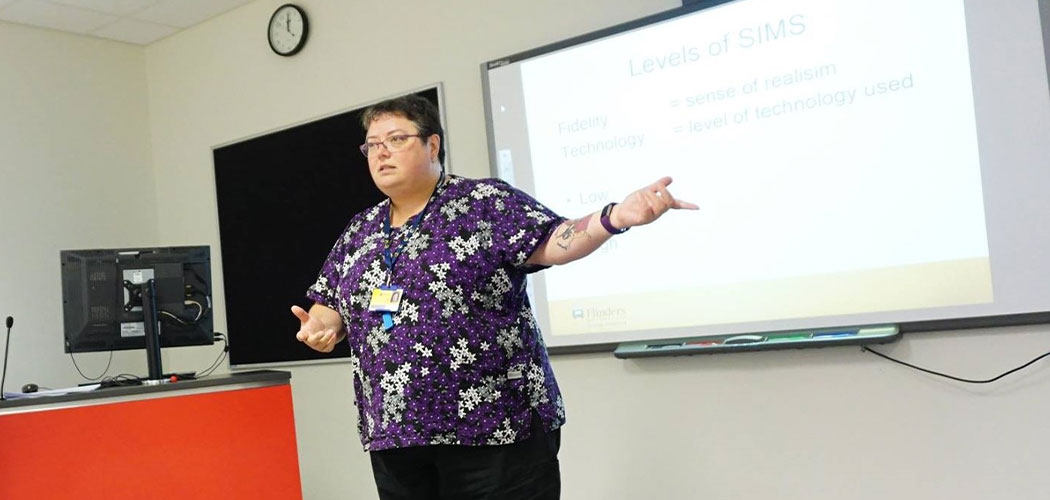With two nurses for parents, Liz McNeill once swore she would never follow in their footsteps.
“I heard all the stories growing up, my Dad was a psychiatric nurse and my mother worked in aged care, and I thought, no thanks,” she recalls. But fate had other ideas. From a young age, Liz was drawn to roles that served the community, initially considering a career in the police force and the military before budget cuts and delays. However, it was in nursing and ultimately midwifery that she found her true purpose.
Having moved from being a critical care registered nurse with a Master’s in nursing to a midwife doing her PhD, Liz is travelling the path of an academic midwife.
For some, the identity of a midwife is tied to clinical practice and being ‘at the bedside’. But this is not necessarily the path for all midwives. Midwifery is a profession grounded in care and evidence. The 2021 State of the World’s Midwifery Report recognises this idea, stating that we need midwives in education, research, governance, and clinical services if we are to strengthen health systems and improve outcomes.
A midwifery academic holds an interesting and diverse role, advancing the profession through research, education, and critical inquiry. They generate and translate evidence that shapes safe, equitable maternity care while mentoring future midwives to think critically and act with care and evidence.
In a field that is inherently connected to clinical practice, choosing the path of academia can be seen as a divergence from the expected. However, for Liz this path was not only a natural extension of her passion for care, but also an opportunity to shape the next generation of midwives. As an academic, Liz has carved a niche in transforming research into practical teaching, innovation, mentoring and educating health professionals around the globe.
A goal for Liz has always been making research feel meaningful, especially to midwifery students.
‘Research is often portrayed as an elite activity, locked in ivory tower. But in truth, everyone engages in research daily; whether buying a car, choosing a pram, or planning a holiday. I tell students to approach it like a CSI case: there’s a problem, you gather evidence, analyse it, and draw conclusions. It is about curiosity and problem-solving’.
‘Research, especially in postgraduate studies, is collaborative, it’s team-based, supported, and interactive, which is why I love working with honours and Master’s students. Every midwife has something they want to change, be it policy, models of care, or professional practice. Engaging with research offers a structured way to explore those ambitions and contribute to change meaningfully’.
One way that Liz is extending her reach and actively promoting midwifery-led research is via her podcast ‘Thru the Pinard’. By creating a platform dedicated to sharing midwife researchers’ stories, insights, and journeys, she’s helping to bring academic work into everyday conversations. Her podcast highlights the value of midwives in driving research and makes that research more accessible and engaging for a wider audience of students, clinicians, and curious minds in over 95 countries.
‘Ultimately, platforms like podcasts and digital learning tools are central to the future of midwifery education and professional development. They offer flexibility, accessibility, and a sense of community, all essential ingredients for a thriving, inclusive profession’.
However, it is not just research and education that an academic midwife engages with, and Liz’s role has also seen her involved in mentoring and capacity building both in Australia and internationally. ‘I think there is a perception that we are the guardians of practice and knowledge as a high-resource country, but having seen midwifery in the Philippines and partnered with international colleagues in many low/middle-income countries such as in Papua New Guinea and Indonesia, we need to learn how these collaborations can support capacity building and innovation. I constantly learn from this knowledge exchange in clinical, education and governance areas’.
Being an academic is also about making sure that evidence also undperpins education. Liz is committed to ensuring the highest quality education for midwifery students by being an active member of the Trans-Tasman Midwifery Education Consortium. She also helps organise and run the Virtual International Day of the Midwife; a free 24-hour conference on May 5th each year. Her involvement reflects a deep dedication to advancing local, national and global midwifery education and building strong, interconnected networks that elevate the profession now and in the future.
In a time when evidence-based midwifery is more important than ever, the role of academic midwives like Liz is crucial to the profession’s future. All midwives have a valuable role to play, whether in clinical care, leadership, or academia; each midwife contributes to strengthening the profession. ‘We need to broaden our definition of midwifery identity and embrace how midwives contribute to the system. An academic midwife is my path, and one that I love’.
Dr Wendy Foster is the Midwife Lead, Professional Practice and Research at the Australian Nursing and Midwifery Federation (SA Branch)








